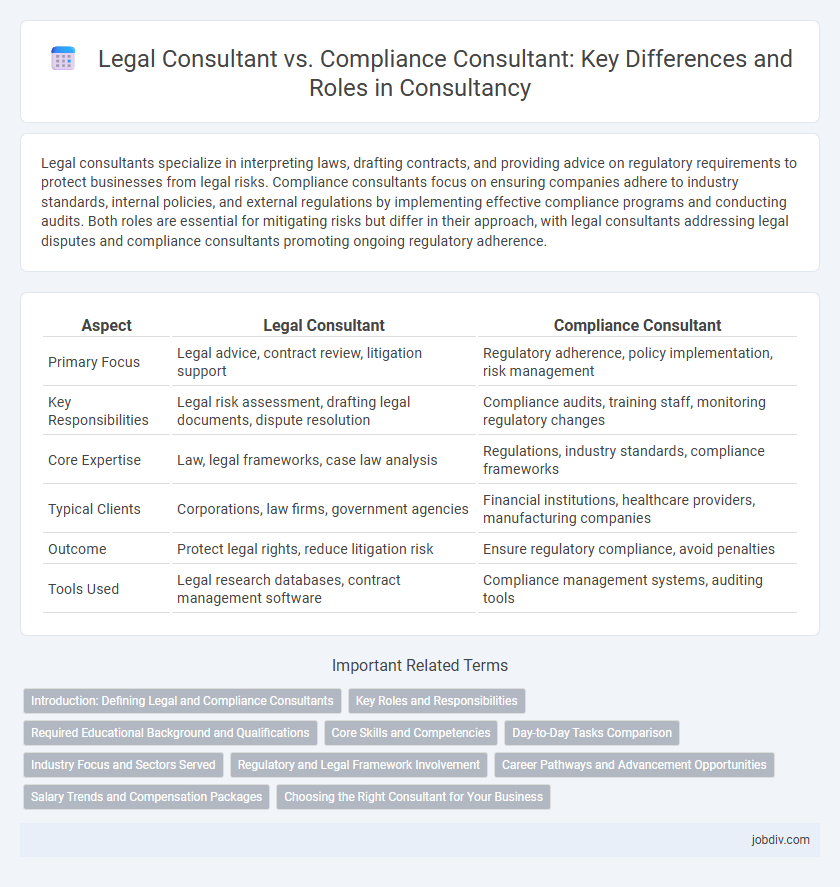Legal consultants specialize in interpreting laws, drafting contracts, and providing advice on regulatory requirements to protect businesses from legal risks. Compliance consultants focus on ensuring companies adhere to industry standards, internal policies, and external regulations by implementing effective compliance programs and conducting audits. Both roles are essential for mitigating risks but differ in their approach, with legal consultants addressing legal disputes and compliance consultants promoting ongoing regulatory adherence.
Table of Comparison
| Aspect | Legal Consultant | Compliance Consultant |
|---|---|---|
| Primary Focus | Legal advice, contract review, litigation support | Regulatory adherence, policy implementation, risk management |
| Key Responsibilities | Legal risk assessment, drafting legal documents, dispute resolution | Compliance audits, training staff, monitoring regulatory changes |
| Core Expertise | Law, legal frameworks, case law analysis | Regulations, industry standards, compliance frameworks |
| Typical Clients | Corporations, law firms, government agencies | Financial institutions, healthcare providers, manufacturing companies |
| Outcome | Protect legal rights, reduce litigation risk | Ensure regulatory compliance, avoid penalties |
| Tools Used | Legal research databases, contract management software | Compliance management systems, auditing tools |
Introduction: Defining Legal and Compliance Consultants
Legal consultants specialize in providing expert advice on laws, regulations, and legal rights to help businesses navigate complex legal frameworks effectively. Compliance consultants focus on ensuring organizations adhere to industry standards, regulatory requirements, and internal policies to mitigate risks and avoid penalties. Both roles play critical parts in maintaining corporate governance, but legal consultants emphasize legal interpretation while compliance consultants prioritize operational adherence.
Key Roles and Responsibilities
Legal consultants specialize in interpreting laws, drafting contracts, and providing expert advice on regulatory requirements to ensure business operations comply with legal standards. Compliance consultants focus on developing, implementing, and monitoring internal policies and procedures to align with industry regulations and prevent risks related to non-compliance. Both roles collaborate to protect organizations from legal penalties while promoting ethical business practices.
Required Educational Background and Qualifications
Legal consultants typically require a law degree (JD or LLB) and must be licensed to practice law, often holding additional certifications such as bar admission or specialization in corporate or contract law. Compliance consultants generally possess a background in business administration, finance, or law, frequently holding certifications like Certified Compliance & Ethics Professional (CCEP) or Certified Regulatory Compliance Manager (CRCM). Both roles demand strong analytical skills, but legal consultants focus on interpreting legislation while compliance consultants ensure adherence to regulatory standards within organizations.
Core Skills and Competencies
Legal consultants specialize in interpreting legislation, drafting contracts, and providing advice on regulatory frameworks to ensure organizations operate within the law. Compliance consultants focus on designing, implementing, and monitoring internal policies and procedures to meet industry standards and regulatory requirements, emphasizing risk management and audit processes. Both roles demand strong analytical skills, attention to detail, and in-depth knowledge of relevant laws and regulations, but legal consultants prioritize legal expertise, while compliance consultants emphasize operational controls and regulatory adherence.
Day-to-Day Tasks Comparison
Legal consultants specialize in advising businesses on regulatory requirements, drafting contracts, and managing legal risks, ensuring compliance with laws and representing clients in negotiations or disputes. Compliance consultants focus on developing, implementing, and monitoring internal policies and controls to adhere to industry standards and governmental regulations, conducting audits, and training employees on compliance protocols. While legal consultants address specific legal issues and litigation risks, compliance consultants maintain ongoing regulatory adherence and risk mitigation across organizational processes.
Industry Focus and Sectors Served
Legal consultants primarily serve sectors such as corporate law, real estate, healthcare, and intellectual property, specializing in regulatory frameworks and contract law within these industries. Compliance consultants focus on highly regulated industries like finance, pharmaceuticals, energy, and manufacturing, ensuring adherence to industry-specific standards, risk management, and governance policies. Both roles require deep knowledge of sector-specific regulations but differ in scope, with legal consultants advising on legal risks and disputes, while compliance consultants enforce operational and ethical standards.
Regulatory and Legal Framework Involvement
Legal consultants primarily focus on interpreting statutes, drafting contracts, and advising on litigation risks within the regulatory and legal framework. Compliance consultants specialize in ensuring organizations adhere to industry-specific regulations and internal policies to mitigate regulatory breaches and maintain operational integrity. Both roles require thorough knowledge of laws but compliance consultants emphasize ongoing regulatory monitoring and implementation.
Career Pathways and Advancement Opportunities
Legal consultants specialize in providing expert advice on laws and regulations to ensure clients navigate legal risks effectively, often advancing toward senior counsel or in-house legal roles. Compliance consultants focus on developing and implementing corporate policies to meet regulatory standards, offering career growth into chief compliance officer or risk management positions. Both pathways demand continuous professional development but differ in specialization, with legal consultants emphasizing legal expertise and compliance consultants prioritizing regulatory adherence and operational controls.
Salary Trends and Compensation Packages
Legal consultants typically command higher salaries than compliance consultants due to their specialized expertise in drafting contracts, litigation support, and legal risk management, with average annual earnings ranging from $90,000 to $150,000 depending on experience and industry. Compliance consultants, focused on regulatory adherence and policy enforcement, earn between $70,000 and $130,000, with compensation packages often including bonuses tied to successful audits and risk mitigation outcomes. Salary trends show a steady increase for both roles driven by growing regulatory complexity and corporate governance demands, with legal consultants receiving greater premium in highly regulated sectors like finance and healthcare.
Choosing the Right Consultant for Your Business
Selecting between a legal consultant and a compliance consultant hinges on your business's specific needs: legal consultants specialize in navigating contracts, litigation, and regulatory frameworks, while compliance consultants focus on adherence to industry standards and risk management protocols. Understanding whether your priority is resolving legal disputes or ensuring ongoing regulatory compliance helps streamline decision-making. Investing in the right consultant safeguards your business against legal liabilities and operational risks, enhancing sustainability and growth.
Legal Consultant vs Compliance Consultant Infographic

 jobdiv.com
jobdiv.com